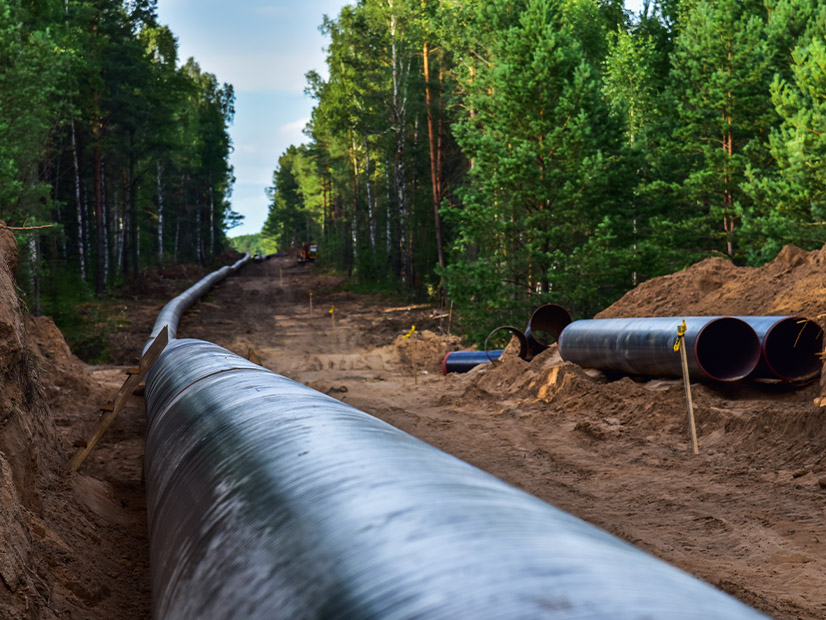WASHINGTON — A pair of recent appeals court decisions signal a shift in how the courts view FERC’s approvals of natural gas infrastructure and has the commission considering its next steps, Chair Willie Phillips said at its open meeting Sept. 19.
The D.C. Circuit Court of Appeals issued a decision in late July vacating FERC’s approval of Transcontinental Gas Pipe Line Co.’s Regional Energy Access (REA) Expansion Project to bring gas from Pennsylvania to New Jersey. (See DC Circuit Vacates Pipeline Approval FERC Issued over NJ’s Objections.)
About a week later, the court vacated FERC’s approval of two LNG export facilities planned to be built near each other on Texas’ Gulf Coast. (See DC Circuit Vacates FERC Approval of Two LNG Facilities in Texas.)
Transco has asked for rehearing on its pipeline certificate and also has filed for a temporary, emergency certificate so it can keep operating the REA pipeline after the court’s mandate is issued, which could happen as early as Sept. 20.
“While I’m not going to prejudge what we will say in that particular proceeding, I want to make clear that I think the court erred in vacating our authorization,” Phillips said. “Transco took steps to build out its system and begin serving customers.”
Right after Phillips made that comment, a protester against FERC’s natural gas policies stood up and started interrupting the meeting, which happened several times during the proceedings.
The court did not consider how disruptive the vacatur of FERC’s approval would be on the pipeline’s customers, Phillips continued after the protester was escorted out of the hearing room. Old Dominion Electric Cooperative already has filed comments in support of Transco’s emergency petition, saying the firm service it uses to fuel the 980-MW Wildcat Point combined cycle plant could be interrupted.
The decision that vacated FERC’s approval of the Rio Grande and Texas LNG projects is up in the air as their developers consider appeals, so no mandate will be issued until that process plays out. FERC is conducting new environmental impact statements on the projects, it said in filings issued Sept. 13.
FERC has won some cases on pipeline issues since Phillips became chair, but he said at his post-meeting press conference that the two decisions represent a break from the past.
“This is clearly a shift in the legal landscape regarding these cases,” Phillips said. “What I focus on, though, is we have new commissioners who are here — who are voting … today for the first time — that I look forward to working with on bipartisan and legally durable ways forward to address these pressing issues.”
The new EISes from the two LNG facilities are going to be reviewed in the coming months, with Phillips saying they should be done by summer 2025, at which point FERC will be able to respond to remanded issues from the case.
The Transco case was approved because the firm found some customers willing to sign up for service on its expanded pipeline, but that was over the objections of the New Jersey Board of Public Utilities and other state agencies who argued the gas would not be needed. The BPU filed a study saying the state had ample gas for this decade and that in the long term, its climate policies will lead to reduced demand for the fuel. But those arguments ultimately lost out.
Phillips explained how such state policies impact FERC decisions at the press conference.
“It’s a matter of a balance test that we use when we consider the need, and we also consider the arguments for and against any proceeding, including our natural gas pipeline cases,” he said. “We consider what the states want; we give it due consideration, as we do with all arguments raised.”
The two court cases could lead FERC to again reconsider its 1999 policy statement on natural gas infrastructure approvals, which former Chair Richard Glick attempted before being rebuked by members of Congress on Capitol Hill. One of those, retiring Sen. Joe Manchin (I-W.Va.), refused to hold hearings on Glick’s renomination in the Energy and Natural Resources Committee, effectively ending his term.
“The shift that we’ve seen in the legal landscape regarding our certifications, on LNG in particular, I think does present an opportunity for us to revisit the 25-year-old policies that we have regarding those authorizations,” Phillips said. “To be clear, we have new colleagues. They’ve just gotten here. We certainly want to give them an opportunity to get up to speed on these matters.”




